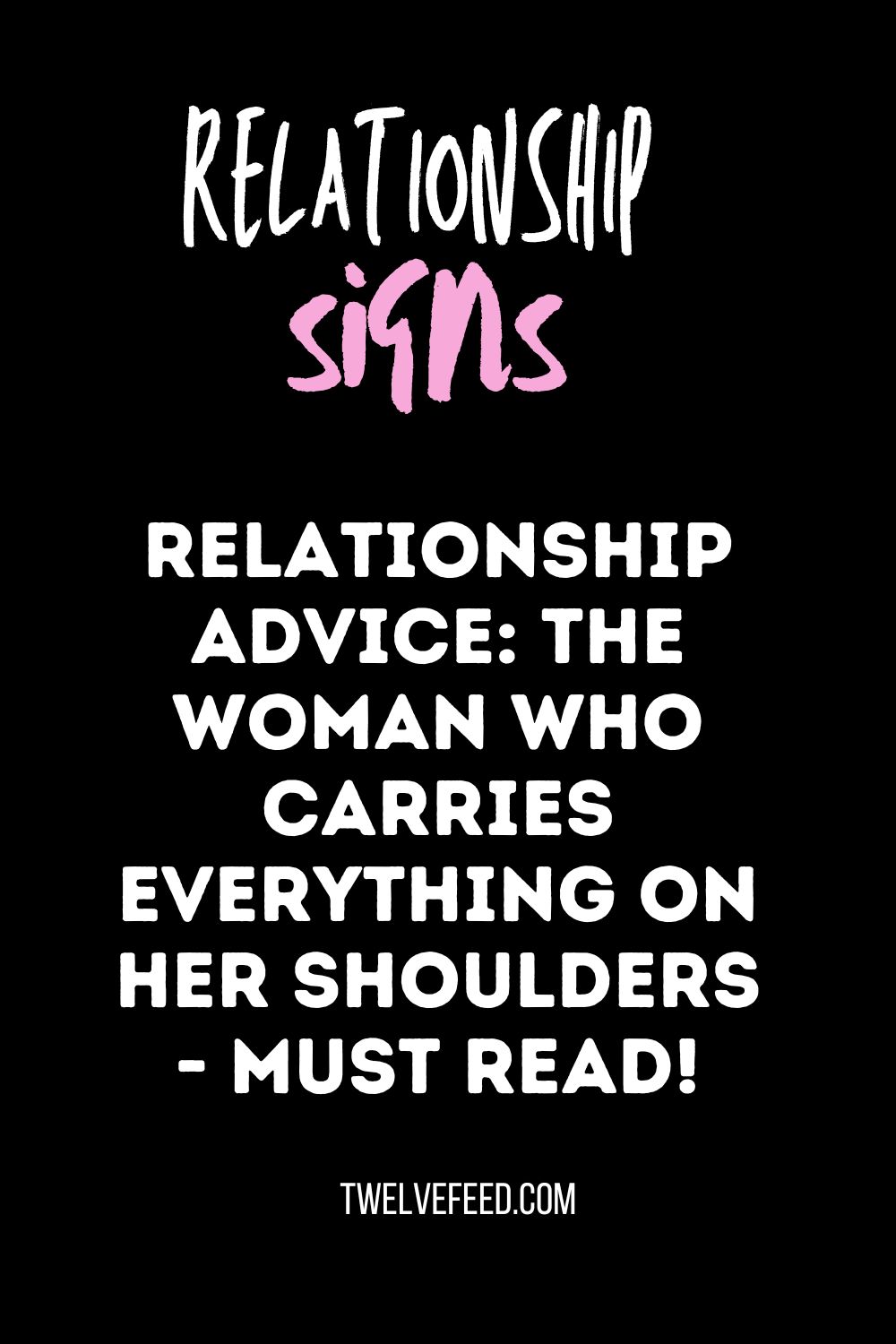
Relationship Advice: The woman who carries everything on her shoulders—must read!
A woman who carries everything on herself—READ! There lives such a woman, maybe very beautiful and interesting, maybe (and most likely) successful in many ways. True, her look is so tired—from everything. She is simply tired of carrying everything on herself. But she continues to do it day after day. She has no one to count on, and life confirms this for her every day.
Where did it all start? It’s hard to say. Maybe with her grandmother, who raised the children alone after the war. Alternatively, she might have been raised by another grandmother who put up with her husband sleeping on the couch, understanding that after the war, a man’s worth was paramount. Maybe with her mother, whose husband “broke” during the crisis of the 90s and started drinking, and she decided to take everything upon herself. Or with her mother, who decided to do without her husband altogether so that this ballast would not interfere with her life. Maybe even earlier—with her great-grandmother, who rejected her roots after the revolution and during Stalin’s purges. We don’t know for sure. There are many options. However, the investigation and the conclusions they made are the same. Count only on yourself; you must be strong; you can do anything.
Our girl grew up with the complete feeling that in this life no one would do anything for her, and she would have to do everything herself, always.
It is more reliable and simpler, and you don’t have to ask or humiliate yourself, and you don’t have to rely on anyone, which means you won’t have to be disappointed. Her mother persistently told her about this, her father pushed her to these conclusions one way or another, and the teachers at school, every time they praised her for her successes, added, “You will go far; you can handle everything yourself!”
Yes, most likely, in her life there is not and never was a relationship with her father. A father who would carry her in his arms, idolize, and protect her. She did not see her father’s caring attitude towards her mother; either she did not allow this care to manifest itself, or it was convenient for him to think that it was not hard for her to carry twenty kilograms of potatoes. And it does not matter whether dad was physically nearby or not at all. All the good things that she could have received from him—she did not receive, for various reasons. Maybe her mother did not allow him to do this; maybe he himself did not want this.
As a child, she learned that everyone is for themselves and that you can’t count on help. When she was bullied in the yard, her mother would say, “Sort it out yourself.” When she struggled to solve equations, her father would dismissively say, “Well, then you’ll get a “2.” When her classmates let her down in group assignments, she also got a “2,” even though she had done her part of the work. It turned out to be much easier to do everything herself. It turned out well, qualitatively, and quickly. Yes, she had to spend more effort, but she wasn’t ashamed of the result.
To ask has always meant to “humiliate oneself.”
Asking for help meant admitting your own failures and defects. You definitely won’t get help, and you’ll be ridiculed. Only those who did everything on their own were respected, as well as the most unpretentious, who could endure any inconveniences in silence. Which is what she did. When her father and mother divorced (as expected, because dad is not a very good person), she became the main person in her mother’s life, who had no right to upset her or disappoint her. Until the end of her days, she will now bear responsibility for her mother’s happiness, and she must bear all this without unnecessary complaints.
And when her first love came, she was glowing with happiness, blossoming, but she didn’t let him carry her school bag. Oh my! As if she couldn’t handle it herself! What would he think of her then? And she paid for herself in the cafe so as not to feel obligated to him. Then she even paid for both of them when he didn’t have any money with him. She gave him beautiful and expensive gifts (to the best of her ability) and pretended that she wasn’t offended by not receiving anything in return. And of course, she always tried to help him. She would do his tests for him, feed him at home, and cover his back. She didn’t expect him to protect her, and what’s more, she sometimes protected him herself!
And the way he betrayed her later, trading her for a fool from the junior class, only reinforced her idea that she shouldn’t have trusted him. And in general, you don’t need to trust anyone in order not to be vulnerable.
Of course, she also chose men, especially.
She liked quiet romantics, wandering in their dreams. And all these rude and impudent “men” only irritated her. Once a guy came up to her, whom she even liked. Until he began to persistently open the door for her, offer her his hand when getting off the bus, and snatch bags. This immediately alerted her, and then he also brought flowers for no reason, almost forcibly forcing her to take them. And then he also said that his wife would never work. Since then, he was on the “blacklist.” This is a real tyrant and despot who intends to completely control the life of his woman! She also did not like those guys who had their own opinion and were adamant in it, and those who were involved in some kind of sport. Although this was mutual.
She started working while still at school.
She pasted up announcements after classes, distributed leaflets, and gradually mastered the Internet—translated texts, wrote product descriptions, filled websites. At the institute (which she entered, of course, on her own!) she managed to work at the market, in a store, in network companies, and as a cleaner. Then she transferred to correspondence courses so that it would be convenient to make a career in a large corporation. And she began working 10-12 hours a day, systematically moving towards her goals. The goals were simple: financial independence, a prestigious job, her own apartment, complete independence.
She also married a romantic who was always looking for himself. He dropped out of one institute, then a second, then a third. Everything was wrong and not right; nothing suited him. He couldn’t work because he was “studying” and again looking for the best place for himself. And why work? She worked three jobs and had enough for everything she needed. She could buy him a new computer and give him money for another admission.
She asked for nothing, demanded nothing, and even expected nothing. She quickly advanced in her career while simultaneously finishing university.
I bought an apartment on credit, and I paid the same credit myself. When I got pregnant, I was a little scared that I would have to eat bread and water, but I gave birth anyway. I worked for almost all 9 months and even completed some deals from the maternity hospital.
Before the birth, the apartment needed some repairs, which he promised to do himself, but there was always something more important. She couldn’t wait any longer, and with a huge belly, alone during the New Year holidays, she re-glued the wallpaper, laid the linoleum, and even glued tiles in the toilet. So that she could somehow live with the child. It turned out that she could do absolutely everything—even in such a condition. She could ask someone, but why?
Of course, no one helped her with the child. Her husband considered it beneath his dignity (especially since it was a girl, not a son!). He never started working, and his maternity leave was coming to an end. The choice was not easy, but she was used to relying only on herself. She found a nanny for the child and went to work. She was exhausted, trying to manage the house, the job, and the child. She didn’t ask for help. Not even from her parents. Otherwise, they would think that she couldn’t handle it.
The husband was still searching for himself, playing “tanks” in between, watching TV, and drinking. He didn’t know which side the refrigerator opened from or where clean shirts came from. He didn’t spend a single sleepless night with his daughter. He was no longer much like that airy romantic, but rather a lazy bear. He was of little use, even more of a hassle, but she endured “for the sake of the child.” She continued to carry everything on her own and even almost tried to give birth to a son for him (what if the son would move him from his place?). Thank God, it didn’t work out. She didn’t have time.
There was also his mother, who always needed something. One thing, then another. Either bring medicine or buy bread. And although she was only fifty and not disabled, for some reason she needed constant care. The son disowned all of this but was terribly angry if his wife refused to fulfill his mother’s request. Although in all the years of her life she had completely forgotten how to say “no” to anyone.
And then a divorce. After almost ten years of such a life, He decided that she did not appreciate and did not understand him, found another, and decided to show her who was the boss at last.
He demanded half of the apartment, for which she was still paying the loan, and he did not contribute a penny. And in order not to humiliate herself, she agreed to everything. She left with the child into nowhere. She did not feel much pain, but the feeling of the dirt of betrayal could not be washed away.
She rented a new apartment and continued working; her daughter was already going to school, bringing home straight A’s. Without her husband, it became even easier—practically “the woman off the cart is easier for the mare.” And now she has everything she wanted—her own apartment, a prestigious job, a daughter, independence, even her own business. But there is no happiness.
What she wants most of all (even though she’s afraid to admit it) is to lean on someone’s strong shoulder and hear, “Rest, I’ll do all this myself.”
She is tired of everything—of the constant responsibility for herself and her child, of the need to keep everything inside (she can’t remember the last time she cried), of loneliness, of the burden she has been carrying her entire life. She buys herself new clothes so that it will be easier to sign contracts at work. She takes care of herself mechanically, again so that the “face of the company” is pleasant. She doesn’t remember if she ever had a heart-to-heart talk with her daughter (she simply doesn’t have the strength for it). She will no longer be able to sincerely answer the question of what she wants. Her shoulders are motionless and heavy, no massage therapist will be able to knead those stones that she carries just above her shoulder blades. She is very strong, independent, and self-sufficient. Mom is proud of her daughter. But there is no happiness.
But there is no strong shoulder.
The men she comes across are the same romantics, weaklings, gigolos. Real men are not interested in her; there is too little femininity in her and no strength at all. And these very real men scare her; she does not understand what to expect from them, how to build her life with them, or how to communicate. What do they need at all if they do not need to be supported and tolerated? And how can you build a relationship at all, preserving your independence, autonomy, and strength? And she is not ready to give this up, because if you trust him, what if he betrays, leaves, cheats, or starts beating?
Sometimes she looks at her stupid and unsuccessful classmates. This one wasn’t particularly smart and always copied tests and homework. She graduated from some technical school or college and then got married. Three children, a loving husband, a house. And lively eyes that sparkle with happiness. No career; she can’t do anything herself, and her husband doesn’t need anyone else; she still carries him in his arms. Or this one, who works as a psychologist at a school, earns mere pennies, but she blossoms and smells sweet. New outfits, cultural outings—museums, theaters, concerts. She never carries anything heavier than her own small handbag. And she looks much younger than her age without any plastic surgery. There is another one—even stranger. Both successful and happy. She does some kind of dancing; she does it with all her heart, and she opened her own dance club, which is not so easy to get into. And her husband is golden, and the children are a sight to behold.
But the main thing you always pay attention to is the eyes. They cannot lie. In happy women, they always shine with something incomprehensible and attractive.
Of course, there are other classmates whose lives are not so joyful. Someone has an alcoholic husband (and at this time our girl is happy that she is not married), someone has a husband who also beats her (she is even happier), someone also carries everything on herself (and they exchange understanding glances), someone lives with her parents and can’t move out, endures scandals. But communicating with them is not particularly interesting—the same look of a broken horse or a beaten dog.
And her daughter grows up next to her, who sees her mother as successful and so lonely. She sees the story of her own father’s betrayal and the men her mother dated after (every suitor was a gigolo or a parasite). She sees that everything needs to be achieved through your own hard work, that there is no one to ask for help and there is no point. She also sees her grandmother, whose fate is not much different from her mother’s, except that she did not build a big business. And even if her mother herself does not want the same fate for her, the daughter will not draw any other conclusions. Everyone for themselves. Carry on as much as you can, while you can. You are responsible for everything in this world.
What kind of person will the one who is already her mother’s only joy grow up to be? The one who, over time, has turned from a demanding little bundle into a grown-up girl with whom you can talk about life and share your difficulties? The one who is used to doing everything herself, just like her mother, not asking for help, not distracting her with her problems?
And so it will continue until someone is found who refuses to carry the responsibility for the whole world around her on her fragile female shoulders, which are not meant for this. Who can say “no” to all these generic scenarios and habits? Who learns, no matter how scary, to ask and be weak and dependent in some way?
Who will see all her “inheritance” and learn to consciously manage it—to discard something, to use something? Who will choose a path different from the paths of her mother and grandmother? But for now there is a woman who carries everything on herself and, with the faded gaze of a mortally tired horse, dreams of burying herself in someone’s strong shoulder. But this dream will remain unrealizable.





